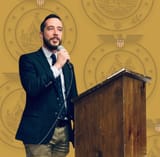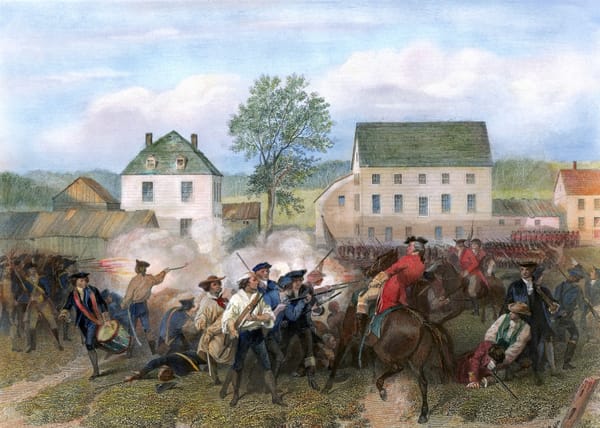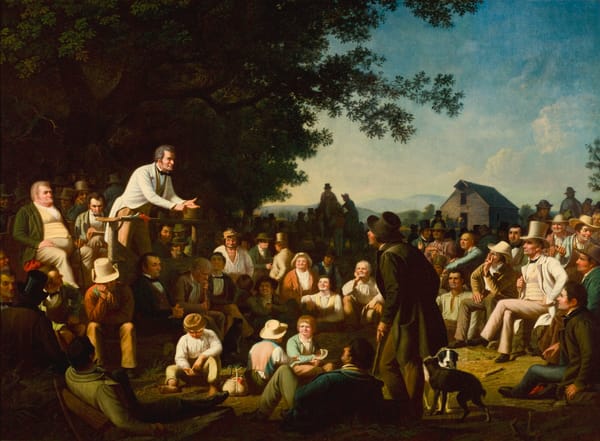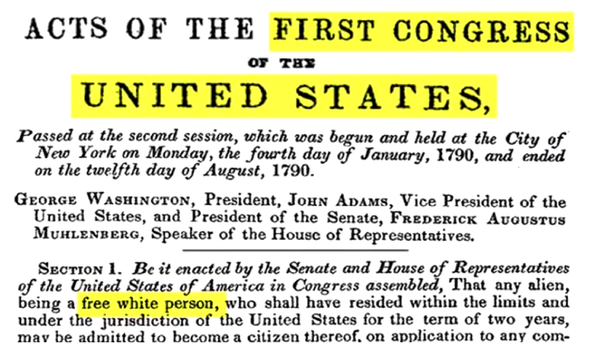Confessional Presbyterian Persecution: Opposition to Right-Wing Christianity in the Free Church of Scotland (Continuing)
The FCC embraces left-wing social doctrine, and persecutes zealous right-wing Christian men.
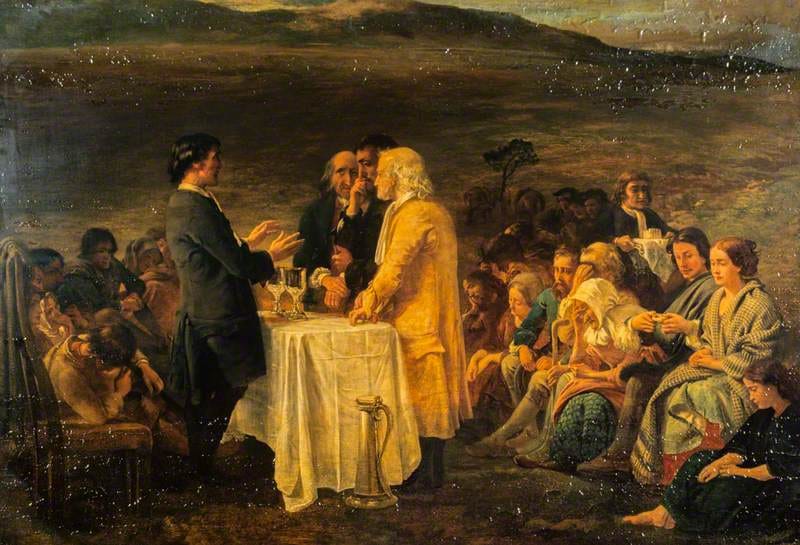
The Free Church of Scotland (Continuing), commonly called the FCC, is a small denomination chiefly in Scotland but with churches also in America. It is known for its firm commitment to historic Presbyterian doctrine, worship, and church government, so much so that it is doubtful any other church today can compete with its conformity to classic Scottish orthodoxy.
My family spent three years in the North Carolina congregation of the FCC. I preached for that church and the other US churches, attended the US Presbytery’s yearly family camp, and twice each year joined its Officers’ Colloquium. So I am familiar with the FCC. I have seen its strengths, and love them. But I have also seen that the same corruption that besets all other churches in our day has not spared them: the FCC embraces left-wing social doctrine, and persecutes zealous right-wing Christian men.
After considering some relevant historical background, we will hear of four men’s recent experience in the FCC, then draw some concluding lessons for all Christians today.
History: Moving the Reformation Left
My own opinion of the Scottish Reformation is that it produced the purest church on earth since the apostles’ times. This judgment was not uncommon in that day, even among non-Scots. Not even their opponents can deny that the 16th- and 17th-century Scottish Presbyterians were fervent advocates for purity, and zealous defenders of their own religious heritage. Sad to say, neither can anyone deny today that this is no longer true. John Knox’s body now sits under a parking lot, and with the rest of Britain, Scotland is proverbial for godlessness.
As in all Christendom, Scotland’s national declension was inseparable from its ecclesiastical declension. In that sad story we highlight two points in which the “Free Church” (formed in the Disruption of 1843, the mother of the FCC, which left and took the name “Continuing” in 2000) had a hand in this declension.
The first is its compromise on the doctrine of church and state. Motivated by real grievances against an overbearing civil magistrate, the Free Church earned its name by freeing itself from both the benefits and strictures of Scotland’s civil establishment, whereby the government had cared for the church’s outward needs like buildings and salaries, but also in that care had imposed terms, like the forcing of unqualified ministers upon unwilling congregations, which were encroachments upon the church’s spiritual rights and duties.
For their sacrificial witness the Free Church men deserve honor. But in their explanation of that witness, they left somewhat to be desired. Falling into a common temptation, by lack of counter-balance they replaced tyranny with libertarianism, reducing the church-state relation to a mere alliance and falsely alleging that their Reformed forefathers had advocated persecution (explained in detail here, pp. 84–104). For example, these sober Scottish divines, despite their better history, joined the chorus with anti-Christian radicals in condemning John Calvin’s Geneva for its execution of the notorious heretic Michael Servetus. In the words of Free Church father William Cunningham (here, p. 21):
No man in modern times defends Calvin’s conduct towards Servetus. No one indeed can defend it, unless he be prepared to defend the lawfulness of putting heretics to death, and this doctrine has been long abandoned by all but papists.
The Free Church fathers, to their credit, still publicly defended the idea of church establishments (even against contemporary American Voluntaryists), but establishment had lost its teeth in theory, and in practice, been abandoned. In this the Free Church men helped Scotland take a step toward outright secularism.
A second failure came around the same time, in the church’s witness on slavery and race. In losing their establishment, the Free Church was in great financial need. Support poured in from sympathetic foreign churches, including that of the Southern Presbyterians in America. It was widely known, and by that time widely disliked, that Southerners held slaves of African descent, and that they defended the propriety of slavery from Scripture, and of African slavery from nature, believing Blacks were naturally inferior to Whites. Many contemporary Scots found this repulsive, and the Free Church was subject to great pressure to send back the Southern gifts.
The controversy was ignited into flame by Frederick Douglass, former slave, staunch abolitionist and feminist, and avid reader of liberal David Strauss and anti-Christian Ludwig Feuerbach. Douglass came to Scotland on a speaking tour, in which he harangued the Free Church for receiving the fruits of Negro bondage. The Free Church tried to maintain the middle ground, not sending back the money, but still insisting on the modern egalitarian conclusion of the necessity of abolition. Its General Assembly wrote in a remonstrance to the American Churches (quoted by a Free Church minister here):
There is no question here as to the heinous sin involved in the institution of American slavery; nor can there be any terms too strong to be employed in pointing out the national guilt which attaches to the continuance of that accursed system, and the national judgments which, under the government of a righteous God, may be expected to mark the divine displeasure against it. Neither can there be any doubt as to the duty incumbent upon all American Christians to exert themselves to the utmost, in every competent way, for the purpose of having it abolished.
To these two historic proofs of left-wing drift we add that in America the FCC has now thrown in its lot with other “Covenanters” (a common name for Christians who hold to Scottish Presbyterianism), in particular those of the Reformed Presbyterian Church of North America (RPCNA), which distinguished itself in the 19th century by letting women serve as deacons, and by stridently opposing slavery and Black subordination in America. The RPCNA’s history is especially relevant here because two ministers recently transferred from that church to the FCC. One of them preached a sermon against slavery less than a year after starting his new charge, showing the historic leftist Covenanter witness is alive and well within the FCC today.
Experience: Four Right-Wing Men Not Welcome in the FCC
This history gives context to the testimonies we will now consider from four men who have faced left-wing corruption in the FCC. The words here are their own.
Stuart DiNenno
My association with the Free Church of Scotland (Continuing) began in either 2007 or 2008, and though I never became a member, I attended their Atlanta church (Reformation Presbyterian in Snellville, Georgia) for several years. The reason that I did not join is because I knew from early on that they had conformed to the apostate world in regard to pseudo-sins such as racism and antisemitism, and would be intolerant of any expression of ethnic superiority and inferiority, any form of racial separation, and any strong condemnation of the anti-Christ Jews. Since I refused to remain silent on these points, believing then (and now) that they were necessary topics for proclamation and discussion, it was obvious that I would not be accepted. This became clear to me after engaging in some private discussions with church members, but particularly after I stated on Facebook my belief that the USA was meant to be a White Anglo-Saxon Protestant nation rather than a racial melting pot, and included a quote of John Jay, one the founding fathers of the USA, to support my statement.

Soon afterward, some family members of one of the Atlanta church elders replied to my post with strong objections. I and others countered their comments, and the discussion quickly degenerated into a contentious debate.
Not long after the Facebook squabble, the man who was then pastor of the church, Warren Gardner, sent me a long email warning me to keep my views to myself, and giving his (mis)interpretations of particular Bible passages. Gardner expressed the typical modernist beliefs, equating Bible passages that speak of the oneness of all believers and humanity’s common origin in Adam with a license to amalgamate the races, and using another passage that forbids partiality in the church as a vehicle to condemn ethnic loyalties and disregard boundaries between them. While he did not blatantly defend the anti-Christ Jews, it was clear that he held a non-oppositional position and disapproved of harsh censure of them.
But what most plainly revealed their base submission to the ungodly world was their response to an event that occurred in 2018. I, as the owner of a landscaping business, had been contacted by a man who had a large residential project, and he expressed a desire to meet with him about the job. But when this man informed me that he had a “husband,” I told him I would not be interested in working with him. In response he posted a negative review on Yelp. I responded in turn, stating that his behavior was perverse and should be called out as such.

This generated a firestorm of controversy resulting in over 150 negative reviews on the same site, numerous oppositional emails, texts, phone calls, an “investigative report” on a local TV news channel, and a message from the “City of Atlanta Human Relations Commission” regarding accusations that I violated Atlanta’s anti-discrimination ordinance (which turned out to be fake). It became obvious that the goal was to put “the homophobe” out of business.
Though I was not a member and had ceased attendance by this time, I was still on relatively amiable terms with the Atlanta FCC, and a good friend of mine named Jeff Mock (now deceased) who was a member of the church, contacted the elders and informed them of my plight. A week later, elder Charles Greenewald, Sr. responded to Jeff in an email, stating that what I did was unwise, and that I should have kept my mouth shut and worked with the two sodomites. He also blamed me for the trouble, saying, “In a very real sense, Stuart set himself up for this, and is going to have to bear the consequences.”
In other words, their belief is that the wise and prudent thing for Christian men to do in a depraved culture is to keep their heads down and their mouths shut in the face of abject wickedness, rather than to boldly speak out and condemn it. We should be willing, in their view, to work silently alongside two men pretending to be a married couple, rather than to follow the example of John the Baptist who spoke out against a perverse marital relationship of a lesser degree.
Since then, more than a few disparaging statements about me have been posted on social media sites by FCC members and church leaders, including FCC minister Gavin Beers, who called me “a wolf” on X in 2025. This can be only a reaction to my recurrent public exposure and opposition to his compromises and those of the FCC in general.

Another example is FCC elder Charles Greenewald, Jr., who said on Facebook in 2024 that for decades I have “haunted the fringes of presbyterian churches, preying on the weak and disenfranchised.” It is true that for many years I have been speaking against the mendacity of today’s “Reformed” religion and declaring that new churches are needed, but he is trying to portray this as something predatory and subversive when it is not.

I also have witnessed FCC leaders drive good men from their churches, for no other reason than that they rejected egalitarian racial views and denounced anti-Christ Jews.
My assessment of the FCC is this: They have all the correct forms of religion. They outwardly follow the Westminster Standards, they biblically regulate their corporate worship, and their preaching is almost entirely in accordance with the Scriptures. Nevertheless, I believe that their Christianity is a counterfeit. Their apparent orthodoxy is but a facade. It is evident to me that their core beliefs (i.e., the doctrines to which they require the most strict adherence and will most quickly drive men from the church for contradicting) are of the world. They have, in effect, adopted a shadow confession of unstated, and yet rigorously enforced, standards that are not derived from the Bible, but have been imported into the church and melded with biblical Christianity for the sake of social conformity and peace with a God-hating world, being oblivious to the fact that, in doing so, they are condemning all the generations of Christians who came before them.
Not that they are alone in this. On the contrary, what I have described above is now ubiquitous in the various denominations. This is a tragedy, but it is especially so in churches like the FCC that appear to have so much of historic Reformed Christianity.
Michael Spangler
We return now to the author’s own experience. My family loved the people, the worship, and the preaching in the FCC in Burlington, North Carolina (Cornerstone Presbyterian), but I began to notice an unwillingness among the leadership to stand firm in important battles of our day. For example, I had made a Facebook post against the widespread evil of effeminacy, and was admonished for it at a meeting of the Presbytery. Another post against the Jews, asserting they were enemies of Christians (just as Paul does, 1 Thessalonians 2:15), was cited at another Presbytery meeting as a proof that I lacked wisdom. In the case of two couples in the churches whose relationship had been evidently harmed by feminism, I expressed concern both to the men and to their pastors. No change that I saw came from this, but both the pastors made sure to express to me their disapproval of my dealing with the issues. Underlying all this was a constant theme, woven into sermons, Presbytery addresses, pastoral counsels, and private conversations, that heavenly piety required earthly quietude: that the best way to deal with the raging issues of the day was to ignore them, repeating the maxim, “First things first,” as if it meant, “Second things never.”
These troubling things were crowned by the church’s zealous opposition to race realism, which was the main cause for my family’s departure. In March 2024 I shared with the pastor, Gavin Beers, a draft of my first article in an intended series, Christian Race Realism. We eventually discussed it in person, and he clearly was not pleased with it. Despite our disagreement I grew in conviction of the necessity of going public on the matter. So on July 1, 2024, I published my first article. A firestorm immediately arose within the congregation. The Session judged this should be dealt with quickly, so on July 5 they sent the following letter in an e-mail to the church:

In this letter they rejected my views as “kinist,” but left this term undefined. They asserted them to be “contrary to Scripture and to our Confession,” but offered no defense beyond the bare citation of one passage. Yet this was judged sufficient warrant to remove me from “all public teaching and function within the church,” which to that point had included preaching, teaching, managing the book table, and leading evangelistic outreach and a men’s prayer meeting. The pastor did say privately, and later publicly, that I was not a heretic, but the Session’s urgent denunciation communicated otherwise. And the people got the message: few of our former friends within that church, some of whom had been very close, now even speak to us.
When this letter was sent, we lost confidence in the Session and began to worship elsewhere. Since that time, Rev. Jonathan Mattull (pastor of the FCC in St. Louis) preached a heated sermon on the matter, and more recently Pastor Beers preached a sermon series, which Cody Justice and I have answered in full: the first of our five episodes is here. Jason Dixon also gives a critical summary of the series in his article, “Self-Evident Things: The Folly of the Anti-Racist Minister.” The whole course of this conflict has also been exacerbated by incendiary public commentary from an RPCNA minister, Edgar Ibarra. I have addressed his slanders in this thread.
My family and I lament this sad division, believe it was not necessary, and miss our friends within the FCC. But the Lord has kept us by his grace. Our membership has been received by Piedmont Presbyterian Church, where I now serve as pastor.
Anonymous
I attended the FCC congregation in Snellville, Georgia (Reformation Presbyterian Church), for an aggregate of six months between the fall of 2023 and summer of 2024. In that time, I befriended most of the congregants and gained their respect, including that of the pastor, Brent Evans.
Because Michael Spangler was already a friend of mine, and he was preaching at another FCC congregation in Burlington, North Carolina (Cornerstone Presbyterian Church), there were times when I asked the Snellville FCC congregants what they thought of him. None of the men whom I asked had anything negative to say, but rather, they commended him for his piety and preaching. Consequently, when I found out that Michael had been publicly condemned by the Burlington FCC and that they had removed him from all functions in their church because of his recently published Christian Race Realism series, I was shocked.
Naturally, because my views on race are similar to Michael’s, I needed to know whether the Snellville FCC would have similar contempt for me. I then messaged a handful of the Snellville men in a group text and provided a link to one of Michael’s articles, asking for their thoughts. Brent Evans responded in the chat, expressing some sympathy for Michael’s first article, but mostly disagreement and concern, along with a copy of the letter from the Burlington FCC’s Session condemning Michael. I then expressed, in the same group chat, agreement with some parts of Evans’ response, but also agreement with Michael’s arguments and disappointment with the Burlington Session for their decision to remove Michael from teaching authority. Evans then texted me in the chat saying, “[Y]ou lack discernment by being so forward to air your private judgment about a warning given by the godly session of Cornerstone FCC,” and, “[Y]ou are not welcome to continue this discussion in this text message thread which includes members of the congregation over which God has given me oversight.”
The following day was the Lord’s Day, so I went to the worship service at the Snellville FCC, as I had been doing. I thought that the matter between Evans and me could be resolved peaceably. However, I was naive. Throughout the service, Evans made comments directed towards me, evidenced by prolonged eye contact with me, in which he promoted miscegenation and warned against “ethnic idolatry.”
After the service, Evans requested to speak with me. He brought in an elder, Charles Greenewald, Sr., who was not part of the group text, to be a witness. The conversation began with an apology from Evans for inappropriately laughing at a pun about the Bible that a visitor had made during a previous Lord’s Day lunch gathering. Then, the tone shifted. Evans insisted that an acquaintance of mine who had been attending services with me be removed from the discussion, which I refused, as that acquaintance was only going to serve as a silent witness. It was not until Greenewald said he had no issue with my acquaintance being there that Evans stopped insisting.
Evans then asked me bluntly, “Why are you here?” This question seemed odd to me since I had always been welcomed before, and neither he nor anyone else had made any indication that this had changed. Despite his behavior during the service, I expressed my appreciation and respect for his preaching and teaching, as I had many times prior, as well as my affection for the congregation. In the discussion that followed, I did not raise my voice against Evans, lecture him, cut him off from speaking, give sarcastic answers, or rail against him. I did not call him to repent, nor did I assert myself over him in any way. All I did was disagree and briefly state why.
During the conversation, Evans made it very clear that he considered me a wolf in sheep’s clothing. This was most manifest when he said, “You will not court my daughter!” which was a metaphorical reference to his fear that I might try to persuade other congregants of my views on race. His disdain was also demonstrated by his angry tone and demeanor toward me, so much so that by the end of the conversation his voice began to noticeably shake. Evans’ contempt became progressively and visibly animated as I withstood him on two issues: (1) expressing disagreement with the Burlington Session, and (2) unashamedly supporting traditional racial views.
Due to my expression of disagreement of the Burlington Session’s condemnation of Michael, Evans accused me of inappropriately taking on the role of a teacher, since I do not possess a theology degree, do not hold church office, and do not have seniority. He concluded that because I supposedly took on the role of a teacher without the necessary wisdom or qualifications, I therefore lacked humility. Regarding my position on race, Evans reiterated his ban on further discussion of the matter between me and the other congregants.
Evans’ behavior and reaction in that discussion was not only odd to me, but it also apparently seemed strange to Greenewald. I am grateful that he was brought in as a witness, because while we were all together, Greenewald stated that he believed me to be sincere and without ill intent.
The following week, I wrote a letter to the participants of the group text mentioned above, in which I articulated what had transpired on the Lord’s Day and stated my issues with Evans. There has been no response from anyone in the group. I also informed the US Presbytery of the FCC about these events, lodging a complaint to them about Evans’ unrighteous behavior toward me. The US Presbytery formally judged my “position to be a violation of the law of God that warrants admonition.” Despite having two witnesses present, they also claimed that I had made “unsubstantiated accusations against a minister” and that this brings me “in danger of censure.”
Thus, these events demonstrated the following to be unmistakably clear. First, that the FCC has forsaken the old paths of the Christian faith to go a whoring with the gods of the world. And second, that the FCC will not tolerate those who refuse to follow them in adulterating their Christian faith.
Gabriel Barnes
I have been a member of Westminster Presbyterian Church (WPC) for nearly three years. Our congregation was established as a preaching station of the FCC in the summer of 2022 in Greenville, Texas. We began meeting in September of the same year. Rev. Craig Scott was installed as the stated pulpit supply. In late 2023, the congregation was established as a fully sanctioned charge and called Rev. Scott as pastor. In my time at the FCC, I profited greatly. The preaching has been a great help to my soul, and the practice of the Communion season has also been a great aid to my growth. I am truly grateful for my time and growth in the FCC.
I do see some issues that have become apparent within the last two years. I will endeavor to explain my experience through a few points and observations.
In July of 2024, my good friend Rev. Michael Spangler released a series of articles on what he called “Christian Race Realism.” These articles took the FCC and the internet by storm. The response was slanderous and vitriolic in many ways. Several Sessions within the Presbytery quickly condemned Rev. Spangler without much qualification, my Session included. I communicated with my pastor about my surprise at how quickly many labeled Rev. Spangler a “heretic,” “false teacher,” etc. I asked a few questions during this time, but remained relatively reserved.
From July of 2024 to June 2025, I began using my social media more. I continued to interact with Rev. Spangler, and to share things from him and others. I encouraged and promoted Rev. Spangler’s new church, shared sermons, and the like. On my social media, I never confessed to views of “racism” or “kinism,” though I would later find out that many took offense toward my activity and began to attribute that to me, even some in my church.
One case of this was a church member informing me that he had unfriended me on Facebook due to my posting “a lot of Spangler’s content.” “Since we have mutual non-white connections who can see those posts,” he said, “I didn’t want to give the impression that I might be aligned with his views.” The member urged me to reconsider Spangler’s teaching in light of Scripture.
In late spring, my Session became involved, desiring to have a “pastoral interview” at a Session meeting. From appearances, their focus was on my social media activity. I learned they had received complaints and screenshots of my social media activity, and had begun to build a dossier of my activity from posts as far back as November of last year. The post from November was not even my post—it was just a post I liked. I found it to be increasingly strange. If my Session had concerns, and as it appears, had been building a case since last November, why were complaints being leveled only now? Moreover, I sought to understand who was offended by my activity, public and private, but to no avail.
During my meeting with the Session, a lot of time was spent discussing my social media activity. They desired that I explain to them what my view was on race and kinism, and I refused largely to entertain the question, because I didn’t confess any of that in my activity. I was accused of creating a scandal and exacerbating it by my continued support of Rev. Spangler. I asked where my sin was, but no answer was given to the question. I was told I was being defensive. At the end of the first meeting, I was counseled to apologize publicly and privately for the offense I had caused, and to repudiate any idea that I support racism or kinism. I prayed over this and communicated to my Session that I couldn’t apologize, as I didn’t believe I had sinned.
In the counsel I received to apologize, I was encouraged to send an email to the congregation. Another elder was very forward that I make a public apology on Facebook as well. This counsel was given and encouraged so that I could remove the alleged scandal. But if I had followed such counsel, I would have created a scandal by involving an audience that wasn’t privy to the offense I was said to have caused.
We had another meeting the following Saturday, in which we went back and forth over “the scandal,” with the Session saying I needed to remove it, especially since Communion was the following day. I was informed that I could either apologize and “remove the scandal” or have my “Communion token” removed. The Session argued that these actions weren’t judicial in any way, but especially when you add a dossier of my activity into the mix, they had the trappings of an investigation.
I remained convinced that I could not apologize, and consequently, I was not welcome at Communion. We have asked the Session to remove our membership and are presently visiting other churches.
Conclusion: Beware Hypocrisy
To summarize the four accounts above: in each we have a man with zeal for righteousness who was forced to leave the FCC. In the process each discovered that despite its reputation for conservative solidity, the FCC is quick to condemn those with right-wing political and social views, and to abuse Christian doctrine to defend this condemnation.
The Bible’s word for what these men saw in the FCC is hypocrisy, that is, play-acting. A hypocrite pretends that he is something he is not. The FCC shows outward zeal for purity, in line with the historic Scottish Reformation. But this masks a zeal for liberalism and egalitarianism, and a softness toward the world’s besetting sins. These are not fruits of Reformed Christianity.
Most of our readers are not in the FCC, nor likely will be. But most of them no doubt can recognize in the FCC a microcosm of the whole church in our nation. Conservative churches of various confessions are presently ramping up their persecution of right-wing Christians in their midst. In light of that, we would draw three practical conclusions.
First, examine the churches. The mere confession of orthodoxy, or even purity in outward practice, is not a mark sufficient to prove a church is solid and trustworthy. You must test all things, even ministers, by the Word of God, as the Bereans did (Acts 17:11). And in that testing you should weigh not only words, but actions, and not only policies, but practices. Do be charitable, and do respect authority, but do not be naive. Don’t ignore warning signs. Also, do not neglect errors in matters of nature, for when they are tolerated or promoted, they cannot but lead to errors in religion.
And furthermore, beware of undue fears that will incline you to neglect examining your church. Some think that they have nowhere else to go, so should not start a process that might end with their being forced out. But Christ will not fail to shepherd you if you are faithful to him. Like Christ himself, when men oppose you in a righteous cause, trust God, and set your face like a flint, knowing that you will not be ashamed (Isaiah 50:7).
Second, examine your own heart. If hypocrisy is so deep within the church, why do you think that you are free from it yourself? If entire churches have successfully deceived their membership, you certainly are able to deceive yourself. Such self-examination is necessary for your cause: how can you stand against corruption while corrupted? It is necessary for your salvation: only the pure in heart will see God (Matthew 5:8). And it is necessary for the church: ecclesiastical hypocrisy will continue to persist as long as men in the church are hypocrites in heart.
In this examination, you ought to take great care. As we have seen above, historic orthodoxy, and the appearance of purity and piety, can mask a craven conformity to worldly standards. Every grace has its attractive counterfeits, and Satan is very skilled at helping men convincingly put on fake Christianity. The sad fact that there are “woke Covenanters” who persecute good men under the color of historic orthodoxy should cause all serious Christians to say to Christ, “Lord, is it I?” (Matthew 26:22).
Third and finally, guard yourself from overreaction. It is the worst when the best things are abused, but that abuse does not make good things bad. Orthodoxy and fidelity, purity and piety, order and authority, remain excellent things, no matter how men pervert them unto evil ends. So oppose the abuse, but retain the use. There is nothing leftist about the historic Christian faith. So lose the leftism, but be sure to keep the Christianity.
Profiting from the content? Donate to the Cause.
Helps us reach our monthly goal.

